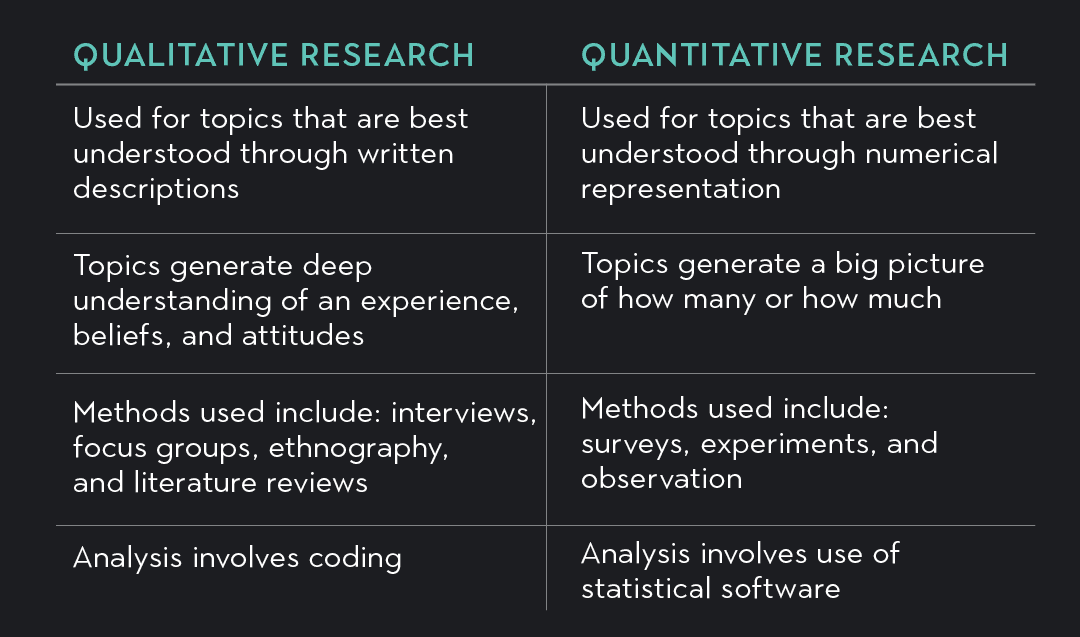In This Article
What Is Qualitative Research?
Qualitative and Quantitative Research, Compared
What Is Quantitative Research?
How do we know what we know? Sometimes, it’s through personal experience: we quickly learn not to touch hot stoves after getting burned. Other times, we gain knowledge from the stories people share with us, as when we learn our family history by listening to our grandma share her memories.
Gaining scientific knowledge, however, requires scientific research. And scientific research involves focused investigation into a topic, a process that entails gathering information in accordance with rigorously defined and maintained standards.
Qualitative research and quantitative research are two approaches a researcher would use to collect information on their topic or area of focus. This article will help you understand the difference between these two fundamental approaches.
What Is Qualitative Research?
Qualitative research is an approach to research that generates deeper understanding of a topic by collecting and analyzing qualitative data. Qualitative data is any information that is expressed through words and descriptions, instead of numbers or statistics. (This article on classical conditioning gives an example of qualitative research).
When to Use Qualitative Research
Your research question or topic will let you know when you should undertake qualitative research.
For example, if your topic is an exploratory one such as observing a community’s way of living, then you would want to do qualitative research. You can think about it this way: how would you describe the experience of poverty in a particular region by using statistics and numbers? Numbers can tell us how many people are poor, or whether poverty rates are increasing or decreasing, but numbers can’t tell us what it feels like to be poor and to experience poverty. Words are needed to describe that experience.
Additionally, if your topic involves perceptions, beliefs, or attitudes, you may want qualitative data. For example, let’s say you want to investigate attitudes toward a hot topic like abortion or gun control. You could investigate the topic by counting how many people are in favor of or against a policy. However, numbers won’t explain why people have certain perceptions, beliefs, or attitudes. If you want to know the why, you need respondents to tell you, with their words, why they feel a certain way.
If you want to understand something in depth, use qualitative data.
Data Collection Methods
Some data collection methods are more useful for gathering qualitative data. The following would be appropriate methods for qualitative research:
Focus groups: Focus groups allow researchers to interview more than one respondent at a time. This group-level interview is structured with open-ended questions which enable the researcher to collect qualitative data from a group. To better capture information, focus groups are often recorded using audio and/or video recording equipment.
Ethnography: Ethnography is a hallmark method of qualitative research. This method places the researcher physically in the heart of a community or experience. By being in the environment or community of interest, the researcher describes everything they see and observe. Ethnographers rely on video and audio equipment, as well as extensive note-taking and interviewing.
How to Analyze Qualitative Data
When working with words, researchers analyze written data by coding qualitative data. Some researchers do this by hand via simple jeans such as different colored highlighters, while others use more complex coding software.
Coding is the process of identifying themes in qualitative data. As an approach to data analysis, coding lets the researcher see where respondents or participants describe similar experiences. When a recurring theme presents itself, a researcher will highlight it as important information to be explored in order to better examine and understand the topic.
Limitations and Strengths
Limitations of qualitative research include the time it takes to analyze the data, as it can be very time consuming to analyze qualitative data for themes. Qualitative research, particularly ethnographic research, has also often been criticized for imposing outside narratives of the researcher’s own devising onto lives and cultures which don’t operate under those terms.
One major strength of qualitative research is that it contributes deeper knowledge and understanding of a topic by allowing in a level of complexity and subjectivity which numbers alone cannot convey.
Qualitative and Quantitative Research, Compared
What Is Quantitative Research?
Quantitative research is an approach to research that works toward an understanding of a topic by collecting and analyzing quantitative data. Quantitative data is any information that is expressed through numbers, such as statistics, percentages, or rates.
When to Use Quantitative Research
Once again, your decision to use quantitative research methods should always be based on the needs of your research project. For example, if you were interested in measuring the effects of generational wealth by seeing whether children who grew up in a certain zip code were more likely to have higher starting salaries than those from a neighboring zip code, your research would require that you collect quantitative data in the form of information regarding the starting salaries of a suitable number of subjects.
Data Collection Methods
Observations: Though observation might seem more like a qualitative method, it can also be useful in quantitative situations. Researchers can make their findings more precise by being physically present at their research site to count what they observe (e.g., counting the number of unhoused people asleep outside compared to the number of people asleep in shelters).
How to Analyze Quantitative Data
Analyzing quantitative data usually requires the use of statistical software, such as SPSS, SAS, or R.
Limitations and Strengths
One limitation of quantitative research is its inability to explain the why behind the numbers. This data can tell part of a story, but qualitative data describes the experiences behind the numbers.
One strength of quantitative research is relative objectivity. While descriptions of an experience are subjective to the participant, numbers are more objective. As such, they don’t require deep interpretation and the relevant data can be easier to gather and analyze.
Explore Outlier's Award-Winning For-Credit Courses
Outlier (from the co-founder of MasterClass) has brought together some of the world's best instructors, game designers, and filmmakers to create the future of online college.
Check out these related courses:







